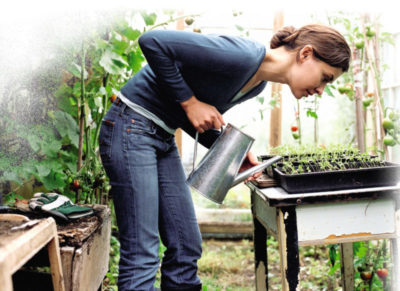
It’s great to be waterwise and get into such habits at home, not least in times of summer drought. Here are our top waterwise gardening tips for this summer:

Watering Accessories at our garden centres
Good timing and good placement of water are extremely important in making a little, or less, go a long way. Be sure to water the base of the plant and the soil rather than spreading water over the leaves and general area; this can also prevent the spread of disease. Always water either first thing in the morning or in the cool of the evening. This minimises the amount of water you will loose to evaporation and in the evening the humidity is lower which reduces the risk of spreading disease.
If drought does kick in and you find your plants extremely dry the best thing to do is to give any suffereing plants a good heavy watering. This is much more effective than frequent but sparse watering as a heavy watering allows the roots to get some water.
Grey water is the term given to water used in households, although it isn’t necessarily grey. Whilst we may not want to drink our bath water, plants aren’t so bothered. It is estimated that UK households use 29% of mains water for baths and washing up. You could siphon bath water to fill watering cans and take your washing up bowl outside to water your plants. Plants are not harmed by detergents or soaps however you should not use water with bleach or strong detergents and dishwasher salts in it. Just ensure that you let the water temperature cool before you use it and don’t store grey water as this will breed germs. Equally we don’t recommend using grey water on crops you will eat raw.
Most established plants in borders, established trees and shrubs will cope with a period of drought and green up again after rain comes. Prioritise your watering needs to plants that really need it such as new plantings, plants in containers, seeds and seedlings and crops (fruit and vegetables).
It is imperative to remove weeds in times of water shortage as these can take precious water from the soil for their own use. By keeping on top of your weeds and hoeing regularly you can ensure that all of the water you give your plants is going directly to them! Mulching is also a great way to conserve water. To mulch, laying down straw, or any chosen mulching material, beneath your plants and on top of the soil. This can prevent moisture being lost from the soil by trapping it in.
Installing a timer controlled irrigation system in your garden can limit the amount of time and water used in your garden. You can fit control timers (such as those from Hozelock or Flo pro) to your tap connected to hoses. These in turn connect to drip feeders or sprinklers. Drip irrigation reduces water loss through evaporation. The drips are fed directly to the roots where plants need the water. Low pressure systems can even be fitted to rainwater butts.
You can install a water butt to any rainwater downpipe you have on the outside of your building. It’s simple to install and you can link several water butts together. Collecting rainwater is free and means that you have a ready supply of garden water when the sun comes out to play! Be sure to clean your water butts annually to eliminate any disease.
Find everything you need for waterwise gardening at our Exeter based garden centres.